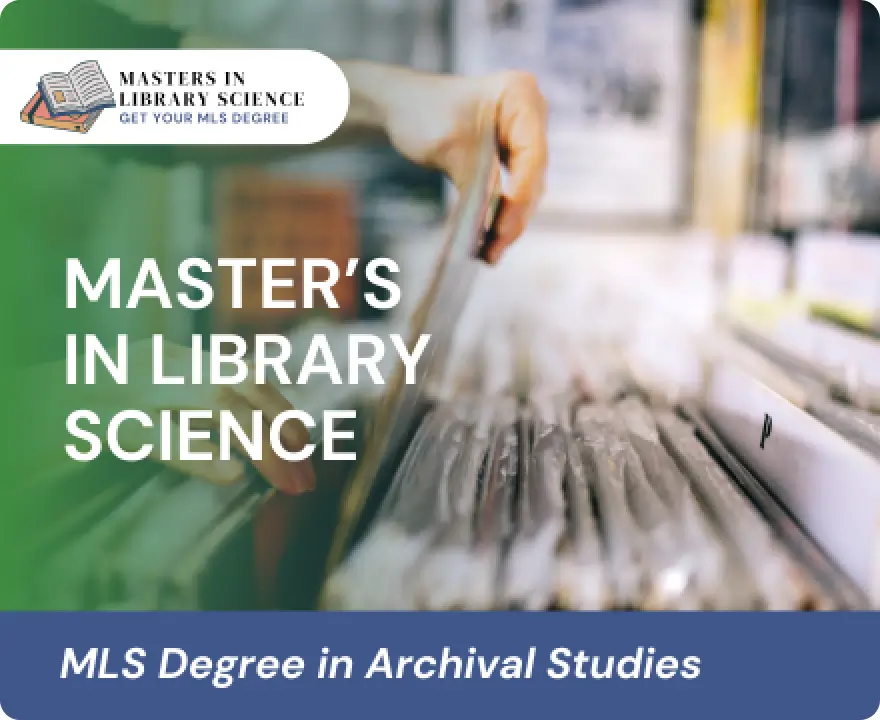Master's in Library Science in Archival Science Degree Online
Find the best online Archival Science MLS program for you
What is a Master’s in Library Science with a Concentration in Archival Science?
A Master’s in Library Science (MLS) with a concentration in Archival Science is a specialized degree that blends traditional library science education with focused training in the field of archives and preservation. This degree prepares students to become experts in managing, preserving, and providing access to valuable historical records, documents, digital media, and cultural artifacts. Archival Science is a field that requires a deep understanding of both technology and history, as well as the methods and ethics involved in preserving information for future generations. Through a combination of theoretical coursework and hands-on experiences, students develop the skills needed to ensure that vital records and historical documents remain accessible, organized, and protected, even as technologies and access methods evolve.
For students interested in preserving history and managing significant records, an online Master’s in Library Science (MLS) degree with a specialization in Archival Science offers focused training on the principles and practices of archiving, digital preservation, and records management. This concentration is ideal for individuals passionate about safeguarding historical documents, cultural artifacts, digital records, and other important resources, ensuring they remain accessible for future generations. An MLS in Archival Science prepares graduates to work in diverse settings, from museums and historical societies to corporate archives, governmental institutions, and digital libraries. Students who enjoy research, history, and detailed organizational work may find this specialization particularly rewarding.
Graduates with an MLS in Archival Science find that their degree can lead to a wide range of careers. As archivists, records managers, digital preservation specialists, or museum curators, they work across different sectors to preserve and protect materials of historical and cultural value. An Archival Science concentration is particularly valuable for those interested in careers that intersect with history, culture, and technology. Whether organizing archives in a museum, ensuring the accessibility of digital collections, or developing systems to catalog records in a corporate or government setting, professionals with this expertise play a crucial role in shaping how information is preserved and accessed. For students driven by a commitment to history and cultural heritage, this specialization offers a fulfilling path that combines academic rigor with meaningful, impactful work.
Admissions Requirements for MLS Degree in Archival Science
Prospective students applying for an MLS degree in Archival Science should expect to meet a series of admissions requirements. These vary by institution, but typically include:
- Bachelor’s degree from an accredited institution
- Minimum GPA requirement (often 3.0 or above)
- Statement of purpose or personal statement detailing interest in Archival Science
- Professional resume or CV showcasing relevant experience
- 2-3 letters of recommendation from academic or professional references
- GRE scores (note: some programs may waive this requirement)
- For international applicants: TOEFL or IELTS scores to demonstrate English proficiency
Some programs may also consider work experience or offer conditional admission based on other qualifications.
What Classes Will I Take in Archival Science MLS Degree?
The curriculum for an MLS in Archival Science provides both theoretical foundations and practical skills in archival work. Most programs require between 30-45 credits to complete and may take 1-2 years for full-time students. Core courses cover essential topics in library science and archival studies, while electives allow students to tailor their learning experience to specific interests, such as digital archiving, cultural heritage preservation, or legal documentation.
Internships or practicums are commonly required, providing hands-on experience in a real-world archival setting. These internships may be completed at local libraries, museums, or government agencies and are especially beneficial for students pursuing online degrees, as they bridge the gap between academic learning and practical application. Typical course names for an MLS in Archival Science include:
- Foundations of Library and Archival Science
- Principles of Archival Organization and Access
- Digital Preservation and Conservation Techniques
- Cataloging and Classification of Archival Materials
- Information Policy, Ethics, and Legal Issues in Archives
- Advanced Records Management
- Cultural Heritage and Historical Preservation
- Digital Libraries and Online Archival Resources
- Research Methods in Archival Studies
- Internship or Practicum in Archival Science
Online Archival Studies MLS Degree Program
Taking an online Master’s in Library Science (MLS) with a specialization in Archival Studies provides an ideal path for students who seek the flexibility to balance their education with other commitments. Online programs allow students to access high-quality coursework from anywhere, offering a comprehensive curriculum designed to cover all aspects of archival science, including preservation techniques, digital archiving, and records management. This flexibility is particularly valuable for working professionals and those with family responsibilities, allowing them to pursue advanced studies without the need to relocate or commute. Online learning platforms often include interactive features, such as live discussions, digital lab simulations, and virtual collaborations, which ensure that students gain both the theoretical knowledge and practical experience needed in the field.
An online Archival Studies MLS program typically requires 30-45 credits and can be completed in one to two years, depending on the student’s pace. Core courses cover a wide range of topics essential to archival science, including cataloging, information retrieval, digital preservation, and archival ethics. Many programs offer options for elective courses, allowing students to specialize in areas such as cultural heritage preservation, museum studies, or legal archives. Some online programs also incorporate practicums or internships, often arranged with local institutions, to provide hands-on experience that complements the virtual classroom learning. These real-world experiences are essential for students to apply the skills they’ve developed in a professional setting, bridging the gap between academic study and career readiness.
How Long Does It Take to Complete a Library Science Master’s Program in Archival Studies?
Completing an MLS degree with a specialization in Archival Studies typically takes 2 years of full-time study, requiring around 36 credit hours of coursework. Students pursuing the degree part-time often take 3 to 4 years, depending on their workload and pace. Programs with an accelerated structure can reduce this timeline to 18 months, though these require a higher course load per semester. In addition to traditional coursework, programs may include thesis or capstone projects focused on archival theory, preservation techniques, and digital asset management. This time frame often accommodates electives tailored to specific career goals, such as government archives or digital preservation.
Internship Requirements for Completing a Master’s in Archival Studies
Internships are a vital part of this program, providing students with hands-on experience in the methods and tools used in archives. Students typically complete 120 to 200 hours of internship work, often in prestigious settings such as state archives, historical societies, museums, or university special collections. Duties may include assessing historical collections, digitizing fragile documents, and creating finding aids to improve accessibility. Institutions like the National Archives and Records Administration (NARA) or the Smithsonian Institution frequently host archival interns, offering networking opportunities that can lead to post-graduate employment.
Careers in Archival Science with an MLS Degree
Graduates with an MLS degree in Archival Science have a variety of career paths available to them, each offering unique opportunities to work with historical documents, digital records, and cultural artifacts. Typical career roles include:
Graduates with an MLS degree in Archival Science have a variety of career paths available to them, each offering unique opportunities to work with historical documents, digital records, and cultural artifacts. Typical career roles include:
- Archivist: Manages collections of historical documents, photographs, films, and other artifacts within museums, government agencies, and private archives.
- Records Manager: Focuses on the organization, maintenance, and preservation of records, especially in corporate or legal settings where records must be managed for compliance and accessibility.
- Digital Archivist: Specializes in the preservation of digital records, including documents, images, and multimedia resources, and works to ensure their long-term accessibility.
- Museum Curator: Oversees the acquisition, organization, and display of artifacts within museum collections, often with a focus on historical preservation.
- Historical Research Specialist: Assists with research projects requiring in-depth knowledge of historical documents and archival resources, working with historians, researchers, and educational institutions.
- Metadata Specialist: Works with digital libraries and archives to ensure that digital resources are accurately cataloged and accessible, focusing on metadata standards and retrieval methods.

For those interested in these roles, an MLS in Archival Science provides essential skills and knowledge that employers value, particularly in fields dedicated to preserving and managing information for educational, historical, and cultural purposes.

Online MLS/MLIS Degrees
- Best Online MLS/MLIS Degree
- Archival Studies Degree Online
- Academic Librarianship Degree
- Children & Youth Services Degree
- Cultural Heritage Preservation Degree
- Digital Libraries Degree
- Law Librarianship
- Public Librarianship Degree
- School Librarianship Degree
- Book Arts Degree
- Music Librarianship Degree
- Records Management
